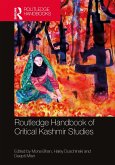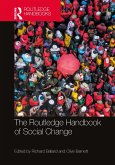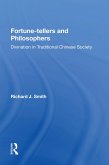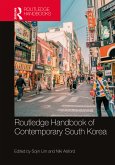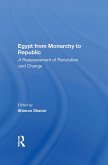Routledge Handbook of Punjab Studies
Herausgeber: Dhanda, Meena; Singh, Pritam
Versandkostenfrei innerhalb Deutschlands
255,99 €
inkl. MwSt.
Versandkostenfrei*
Erscheint vorauss. 12. Februar 2026
Melden Sie sich
hier
hier
für den Produktalarm an, um über die Verfügbarkeit des Produkts informiert zu werden.

128 °P sammeln
Routledge Handbook of Punjab Studies
Herausgeber: Dhanda, Meena; Singh, Pritam
- Gebundenes Buch
Chapters cover the history, politics, economics, culture, religion and society as well as the Punjab diaspora, and the handbook is structured into six parts: Punjab, Partition and Beyond; Economic Development: Labour, Resources and Challenges; Political Contestations and Movements; Cultural Repositioning: Language, Literature and the Arts; Religion, Caste and Gender; and Diasporic Dilemmas. Topics explored include: migration, memory, anti-colonialism, industrialisation, federalism, river water disputes, agriculture, ecology, communism, conflict, militancy, counterinsurgency, poetry, cinema,…mehr
Andere Kunden interessierten sich auch für
![Routledge Handbook of Critical Kashmir Studies Routledge Handbook of Critical Kashmir Studies]() Routledge Handbook of Critical Kashmir Studies264,99 €
Routledge Handbook of Critical Kashmir Studies264,99 €![The Routledge Handbook of Social Change The Routledge Handbook of Social Change]() The Routledge Handbook of Social Change263,99 €
The Routledge Handbook of Social Change263,99 €![The Fragile Entente The Fragile Entente]() Robert E BedeskiThe Fragile Entente123,99 €
Robert E BedeskiThe Fragile Entente123,99 €![Fortune-tellers and Philosophers Fortune-tellers and Philosophers]() Richard J SmithFortune-tellers and Philosophers40,99 €
Richard J SmithFortune-tellers and Philosophers40,99 €![Routledge Handbook of Contemporary South Korea Routledge Handbook of Contemporary South Korea]() Routledge Handbook of Contemporary South Korea45,99 €
Routledge Handbook of Contemporary South Korea45,99 €![Galilee Divided Galilee Divided]() Frederic C HofGalilee Divided40,99 €
Frederic C HofGalilee Divided40,99 €![Egypt From Monarchy To Republic Egypt From Monarchy To Republic]() Shimon ShamirEgypt From Monarchy To Republic40,99 €
Shimon ShamirEgypt From Monarchy To Republic40,99 €-
-
-
Chapters cover the history, politics, economics, culture, religion and society as well as the Punjab diaspora, and the handbook is structured into six parts: Punjab, Partition and Beyond; Economic Development: Labour, Resources and Challenges; Political Contestations and Movements; Cultural Repositioning: Language, Literature and the Arts; Religion, Caste and Gender; and Diasporic Dilemmas. Topics explored include: migration, memory, anti-colonialism, industrialisation, federalism, river water disputes, agriculture, ecology, communism, conflict, militancy, counterinsurgency, poetry, cinema, plays, music, theology, sexuality, inequality, tribal marginalisation, multiculturalism, diasporic homeland connections, and gender-based violence. Providing an interdisciplinary analysis by a set of international contributors, this handbook will be an indispensable resource for researchers and students in the field of South Asian Studies in general and Sikh and Punjab Studies in particular.
Produktdetails
- Produktdetails
- Verlag: Taylor & Francis Ltd
- Seitenzahl: 672
- Erscheinungstermin: 12. Februar 2026
- Englisch
- Abmessung: 246mm x 174mm
- Gewicht: 453g
- ISBN-13: 9780367229108
- ISBN-10: 0367229102
- Artikelnr.: 75340987
- Herstellerkennzeichnung
- Libri GmbH
- Europaallee 1
- 36244 Bad Hersfeld
- gpsr@libri.de
- Verlag: Taylor & Francis Ltd
- Seitenzahl: 672
- Erscheinungstermin: 12. Februar 2026
- Englisch
- Abmessung: 246mm x 174mm
- Gewicht: 453g
- ISBN-13: 9780367229108
- ISBN-10: 0367229102
- Artikelnr.: 75340987
- Herstellerkennzeichnung
- Libri GmbH
- Europaallee 1
- 36244 Bad Hersfeld
- gpsr@libri.de
Pritam Singh is Professor Emeritus in Economics at Oxford Brookes Business School, UK. Professor Singh is on the editorial board of several leading journals in South Asian/Punjab Studies and eco-socialist studies. He has held visiting positions at the University of Oxford, UK, University of Uberlandia, Brazil, Lomonosov Moscow State University, Russia, and Jawaharlal Nehru University, India. In 2015, The World Association of Political Economy honoured him with the Distinguished Achievement Award in Political Economy, and in 2021, the University of California (Riverside) honoured him with a Lifetime Achievement Award for his distinguished contribution to Sikh and Punjab Studies. Meena Dhanda is Professor of Philosophy and Cultural Politics at the University of Wolverhampton, UK, and is also a Visiting Professor in the Department of Media and Communications at the London School of Economics and Political Science, UK. Her transdisciplinary research lies at the intersection of caste, class, gender, and race.
1. IntroductionPart I - Punjab, Partition and Beyond 3. From a Border
Region to the Power Engine: Punjab as the Centrefold of the Pakistani State
4. Partition and the Search for a Sikh State: From Azad Punjab to Punjabi
Suba 5. Microhistory and Memory: A Pioneer's Life Story of Migration and
Home 6. Memorialising Sikh and Punjab History in the Public Realm 7.
Hindutva in Punjab: Appropriation and Resistance 8. The Anti-Colonialism of
Bhagat Singh 9. Prospects for Punjab's Economic Development 10. Rural
Commercial Capital in Punjab: Emergence, Disruption and Reconstitution 11.
Structure of Industrialisation in Punjab 12. Agro-Industrialisation in
Indian Punjab: Rationale, Factors and Policy Options 13. Industrial
Development and Labour Structure: Evidence from the Industrial Sector of
Indian Punjab 14. Water Resources in Punjab: Status, Use and Challenges 15.
Sustainable Agriculture in Punjab: Questions from an Ecological Justice
Perspective 17. Communist Movement in Punjab 18. Dynamics of Co-existence
of Competing Identities in Punjab Politics 19. Trolley Times in Farmers'
Protest and Beyond 20. Subaltern Religious Movements in the Punjab 21. Sikh
Militancy 22. Living the Past in the Digital Present: The Anti-Sikh
Violence of 1984 and Mediated Memory 23. From Suppression to Service:
Ethnicity and Counterinsurgency in the Punjab ConflictPart IV - Cultural
Repositioning: Language, Literature and the Arts 24. Punjabi as an
Anti-Establishment Language in Pakistan 25. Beyond the Nation: Punjabi
Language and Literature in India, Pakistan, and Beyond 26. Twentieth
Century Punjabi Literature: Key Signposts 27. Print, Publication, and
Punjabi Literary Periodicals 28. Fascinating Contours of Literary
Creativity of Punjabi Dalits 29. Anticolonialism and Protest Poetry in
Panjab 30. Patriarchal Masculinity, Homosocial Intimacy, and Male Failure
in Punjabi Cinema 31. The Defiant Voices from the Margins: The Punjabi
Plays of Lakht Pasha 32. Listening to Nature and the Cosmos through
GurbaniPart V - Religion, Caste and Gender 33. Sikh Theology Through a
Feminist Lens 34. 35. 36. 37. Christianity in Punjab and Punjabi Christians
38. Tribal Communities in Punjab: Past and Present 39. The Quandary of
Caste for Sikhs in the UK 40. Navigating Belonging: Sikhs' Understandings
of the Multicultural Landscape in Britain 41. Decolonial Queer Politics of
Punjabi Diasporas 42. Punjabi Diaspora-Homeland Connections: 43. Precarity
and Politization of Punjabi Diasporas 44. Unpacking the White Gaze in
Recent Diasporic Punjabi Women's Memoirs 45. Gender-Based Violence in
Diaspora Sikh Punjabi Communities
Region to the Power Engine: Punjab as the Centrefold of the Pakistani State
4. Partition and the Search for a Sikh State: From Azad Punjab to Punjabi
Suba 5. Microhistory and Memory: A Pioneer's Life Story of Migration and
Home 6. Memorialising Sikh and Punjab History in the Public Realm 7.
Hindutva in Punjab: Appropriation and Resistance 8. The Anti-Colonialism of
Bhagat Singh 9. Prospects for Punjab's Economic Development 10. Rural
Commercial Capital in Punjab: Emergence, Disruption and Reconstitution 11.
Structure of Industrialisation in Punjab 12. Agro-Industrialisation in
Indian Punjab: Rationale, Factors and Policy Options 13. Industrial
Development and Labour Structure: Evidence from the Industrial Sector of
Indian Punjab 14. Water Resources in Punjab: Status, Use and Challenges 15.
Sustainable Agriculture in Punjab: Questions from an Ecological Justice
Perspective 17. Communist Movement in Punjab 18. Dynamics of Co-existence
of Competing Identities in Punjab Politics 19. Trolley Times in Farmers'
Protest and Beyond 20. Subaltern Religious Movements in the Punjab 21. Sikh
Militancy 22. Living the Past in the Digital Present: The Anti-Sikh
Violence of 1984 and Mediated Memory 23. From Suppression to Service:
Ethnicity and Counterinsurgency in the Punjab ConflictPart IV - Cultural
Repositioning: Language, Literature and the Arts 24. Punjabi as an
Anti-Establishment Language in Pakistan 25. Beyond the Nation: Punjabi
Language and Literature in India, Pakistan, and Beyond 26. Twentieth
Century Punjabi Literature: Key Signposts 27. Print, Publication, and
Punjabi Literary Periodicals 28. Fascinating Contours of Literary
Creativity of Punjabi Dalits 29. Anticolonialism and Protest Poetry in
Panjab 30. Patriarchal Masculinity, Homosocial Intimacy, and Male Failure
in Punjabi Cinema 31. The Defiant Voices from the Margins: The Punjabi
Plays of Lakht Pasha 32. Listening to Nature and the Cosmos through
GurbaniPart V - Religion, Caste and Gender 33. Sikh Theology Through a
Feminist Lens 34. 35. 36. 37. Christianity in Punjab and Punjabi Christians
38. Tribal Communities in Punjab: Past and Present 39. The Quandary of
Caste for Sikhs in the UK 40. Navigating Belonging: Sikhs' Understandings
of the Multicultural Landscape in Britain 41. Decolonial Queer Politics of
Punjabi Diasporas 42. Punjabi Diaspora-Homeland Connections: 43. Precarity
and Politization of Punjabi Diasporas 44. Unpacking the White Gaze in
Recent Diasporic Punjabi Women's Memoirs 45. Gender-Based Violence in
Diaspora Sikh Punjabi Communities
1. IntroductionPart I - Punjab, Partition and Beyond 3. From a Border
Region to the Power Engine: Punjab as the Centrefold of the Pakistani State
4. Partition and the Search for a Sikh State: From Azad Punjab to Punjabi
Suba 5. Microhistory and Memory: A Pioneer's Life Story of Migration and
Home 6. Memorialising Sikh and Punjab History in the Public Realm 7.
Hindutva in Punjab: Appropriation and Resistance 8. The Anti-Colonialism of
Bhagat Singh 9. Prospects for Punjab's Economic Development 10. Rural
Commercial Capital in Punjab: Emergence, Disruption and Reconstitution 11.
Structure of Industrialisation in Punjab 12. Agro-Industrialisation in
Indian Punjab: Rationale, Factors and Policy Options 13. Industrial
Development and Labour Structure: Evidence from the Industrial Sector of
Indian Punjab 14. Water Resources in Punjab: Status, Use and Challenges 15.
Sustainable Agriculture in Punjab: Questions from an Ecological Justice
Perspective 17. Communist Movement in Punjab 18. Dynamics of Co-existence
of Competing Identities in Punjab Politics 19. Trolley Times in Farmers'
Protest and Beyond 20. Subaltern Religious Movements in the Punjab 21. Sikh
Militancy 22. Living the Past in the Digital Present: The Anti-Sikh
Violence of 1984 and Mediated Memory 23. From Suppression to Service:
Ethnicity and Counterinsurgency in the Punjab ConflictPart IV - Cultural
Repositioning: Language, Literature and the Arts 24. Punjabi as an
Anti-Establishment Language in Pakistan 25. Beyond the Nation: Punjabi
Language and Literature in India, Pakistan, and Beyond 26. Twentieth
Century Punjabi Literature: Key Signposts 27. Print, Publication, and
Punjabi Literary Periodicals 28. Fascinating Contours of Literary
Creativity of Punjabi Dalits 29. Anticolonialism and Protest Poetry in
Panjab 30. Patriarchal Masculinity, Homosocial Intimacy, and Male Failure
in Punjabi Cinema 31. The Defiant Voices from the Margins: The Punjabi
Plays of Lakht Pasha 32. Listening to Nature and the Cosmos through
GurbaniPart V - Religion, Caste and Gender 33. Sikh Theology Through a
Feminist Lens 34. 35. 36. 37. Christianity in Punjab and Punjabi Christians
38. Tribal Communities in Punjab: Past and Present 39. The Quandary of
Caste for Sikhs in the UK 40. Navigating Belonging: Sikhs' Understandings
of the Multicultural Landscape in Britain 41. Decolonial Queer Politics of
Punjabi Diasporas 42. Punjabi Diaspora-Homeland Connections: 43. Precarity
and Politization of Punjabi Diasporas 44. Unpacking the White Gaze in
Recent Diasporic Punjabi Women's Memoirs 45. Gender-Based Violence in
Diaspora Sikh Punjabi Communities
Region to the Power Engine: Punjab as the Centrefold of the Pakistani State
4. Partition and the Search for a Sikh State: From Azad Punjab to Punjabi
Suba 5. Microhistory and Memory: A Pioneer's Life Story of Migration and
Home 6. Memorialising Sikh and Punjab History in the Public Realm 7.
Hindutva in Punjab: Appropriation and Resistance 8. The Anti-Colonialism of
Bhagat Singh 9. Prospects for Punjab's Economic Development 10. Rural
Commercial Capital in Punjab: Emergence, Disruption and Reconstitution 11.
Structure of Industrialisation in Punjab 12. Agro-Industrialisation in
Indian Punjab: Rationale, Factors and Policy Options 13. Industrial
Development and Labour Structure: Evidence from the Industrial Sector of
Indian Punjab 14. Water Resources in Punjab: Status, Use and Challenges 15.
Sustainable Agriculture in Punjab: Questions from an Ecological Justice
Perspective 17. Communist Movement in Punjab 18. Dynamics of Co-existence
of Competing Identities in Punjab Politics 19. Trolley Times in Farmers'
Protest and Beyond 20. Subaltern Religious Movements in the Punjab 21. Sikh
Militancy 22. Living the Past in the Digital Present: The Anti-Sikh
Violence of 1984 and Mediated Memory 23. From Suppression to Service:
Ethnicity and Counterinsurgency in the Punjab ConflictPart IV - Cultural
Repositioning: Language, Literature and the Arts 24. Punjabi as an
Anti-Establishment Language in Pakistan 25. Beyond the Nation: Punjabi
Language and Literature in India, Pakistan, and Beyond 26. Twentieth
Century Punjabi Literature: Key Signposts 27. Print, Publication, and
Punjabi Literary Periodicals 28. Fascinating Contours of Literary
Creativity of Punjabi Dalits 29. Anticolonialism and Protest Poetry in
Panjab 30. Patriarchal Masculinity, Homosocial Intimacy, and Male Failure
in Punjabi Cinema 31. The Defiant Voices from the Margins: The Punjabi
Plays of Lakht Pasha 32. Listening to Nature and the Cosmos through
GurbaniPart V - Religion, Caste and Gender 33. Sikh Theology Through a
Feminist Lens 34. 35. 36. 37. Christianity in Punjab and Punjabi Christians
38. Tribal Communities in Punjab: Past and Present 39. The Quandary of
Caste for Sikhs in the UK 40. Navigating Belonging: Sikhs' Understandings
of the Multicultural Landscape in Britain 41. Decolonial Queer Politics of
Punjabi Diasporas 42. Punjabi Diaspora-Homeland Connections: 43. Precarity
and Politization of Punjabi Diasporas 44. Unpacking the White Gaze in
Recent Diasporic Punjabi Women's Memoirs 45. Gender-Based Violence in
Diaspora Sikh Punjabi Communities

